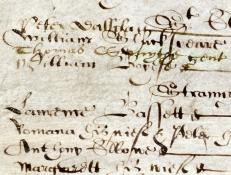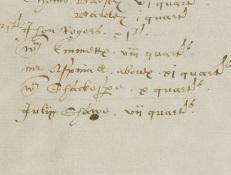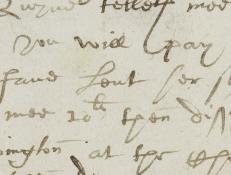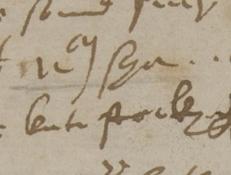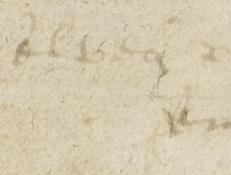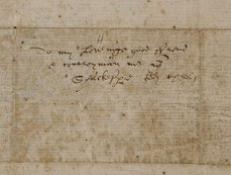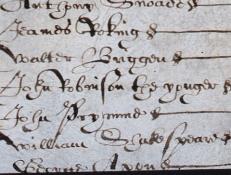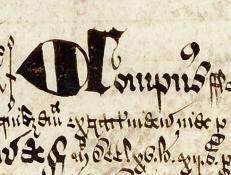To learn more about wills, please visit Alan H. Nelson's essay on the practice of will making in Shakespeare's England. To learn more about lawsuits, read his thematic essay on lawsuits in Shakespeare's England.
All Documents
November 29, 1596
The enrolled entry known to Shakespeare scholars as the “Langley writ” was recorded in the Court of King’s Bench between October 29, 1596 and January 24, 1597. The writ constitutes presumptive evidence that William Shakespeare, formerly of St.
November 15, 1597
Lay subsidies were a type of tax based on personal wealth. In London, the collection of subsidies was managed at the local level of ward and parish. Each collection typically generated one lay subsidy roll and one default roll for each ward.
February 4, 1598
In this 1598 survey of those storing grain in Stratford-upon-Avon, “W[illia]m Shackesp[ear]e” is listed as holding 10 quarters of malt.
November 24, 1598
While in London during the autumn of 1598, Richard Quiney received at least four letters from Daniel Baker, written on October 17, October 26, November 13 and November 24, the last of which is shown here. Baker addresses Quiney as his uncle, and refers to Quiney’s wife as his aunt.
ca. November 4, 1598
While in London in the autumn of 1598, Richard Quiney received five letters from his father Adrian. Four are dated (October 20 and 29, November 10 and 18).
January 24, 1598
In this letter, dated January 24, 1598, Abraham Sturley wrote to fellow Stratford townsman Richard Quiney about several town matters, including a rumor regarding Shakespeare’s intent to purchase land.
November 4, 1598
On October 25, 1598, Richard Quiney wrote both to Shakespeare, asking for his help in securing a loan of £30 and to his friend Abraham Sturley in Stratford-upon-Avon to let him know the request had been made.
October 25, 1598
This is the only known surviving letter written to Shakespeare, but he may never have received it. (No known letters survive written by him.) It is addressed “To my Loveinge good ffrend & contreymann Mr.
October 1, 1598
Lay subsidies were a type of tax based on personal wealth. In London, the collection of subsidies was managed at the local level of ward and parish.
1598- 1599
Lay subsidies were a type of tax based on personal wealth. In London, the collection of subsidies was managed at the local level of ward and parish.

![The Langley writ [1], thumbnail detail](https://shakespearedocumented.folger.edu/sites/default/files/styles/document_thumbnail/public/document-thumbnails/KB29-234%20%281%29_thumbnail%20detail.jpg?itok=FAoIJUL_)
